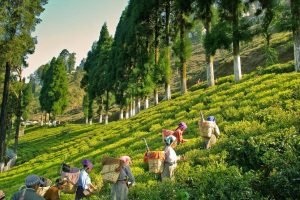Takdah is a serene hill station located in the Darjeeling district of West Bengal, India, about 28 kilometers from Darjeeling town. Nestled at an altitude of around 4,000 to 4,500 feet, it is best known for its colonial-era British bungalows, lush tea gardens, and peaceful, foggy atmosphere.
When people think of Darjeeling, the mind instantly travels to the bustling Mall Road, toy trains, and sweeping tea plantations. But few know of Takdah, a sleepy hill retreat just 28 km from Darjeeling town, where time seems to stand still. Once a British cantonment during the colonial era, It is now a peaceful, less-traveled gem tucked away in the Eastern Himalayas, perfect for travelers seeking tranquility, history, and raw natural beauty.
In this blog, let’s uncover everything about Takdah — the hidden heritage village of North Bengal.

Where is Takdah?
It is located in the Darjeeling district of West Bengal, around 28 km from Darjeeling town and 60 km from Siliguri. It lies at an altitude of 4,000 to 4,500 feet, offering cool weather year-round, misty mornings, and lush green hills dotted with British-era bungalows.
The name “Takdah” is believed to be derived from the Lepcha word ‘Tukdah’, meaning ‘mist’ or ‘fog’, which suits its personality perfectly.
Why Visit Takdah?
1. Colonial Charm
It is home to many British-era bungalows, now converted into quaint homestays. Their moss-covered roofs, wooden architecture, and antique furniture give off a vintage British countryside vibe that makes you feel like you’re living in a different era.
2. Lush Tea Gardens
Surrounded by picturesque tea estates like Rungli Rungliot, Gielle, and Teesta Valley, It offers panoramic views of rolling green hills and an authentic experience of rural tea culture.
3. Off-the-Beaten-Path Tranquility
Unlike Darjeeling’s tourist-packed streets, It offers solitude and serenity, making it an ideal destination for writers, couples, nature lovers, and slow travelers.
4. Nature & Biodiversity
Takdah is rich in flora and fauna. You’ll come across orchid farms, pine and cedar forests, and numerous bird species, making it a paradise for birdwatchers and nature enthusiasts.
Top Places to Visit in and Around Takdah
1. British-Era Bungalows
Several old cottages like Glenburn Bungalow and Woodside Bungalow offer colonial architecture, vintage furniture, and warm hospitality.
2. Rungli Rungliot Tea Garden
One of the most beautiful and lesser-known tea estates near Takdah, offering walking trails, tea factory visits, and photo ops.
3. Takdah Orchid Center
One of the oldest orchid centers in Bengal, housing rare Himalayan orchid species — a must-visit for nature lovers.
4. Barbotey Hanging Bridge
A unique suspension bridge near the Teesta River, offering scenic views and great photo spots.
5. Tinchuley Viewpoints
A short drive from Takdah takes you to Tinchuley, a small eco-village with panoramic viewpoints of the Kanchenjunga range, sunrise spots, and orange orchards.
6. Monasteries and Temples
Visit Dechhen Pema Tshoiling Monastery for spiritual vibes and peaceful surroundings.
Where to Stay in Takdah
Most accommodations in Takdah are heritage homestays and family-run guesthouses. Popular options include:
Saino Heritage Guest House
Barbunglow Homestay
Tinchuley Takdah Retreat
Glenburn Tea Estate Bungalows (premium)
These stays offer home-cooked organic meals, local hospitality, and immersive cultural experiences.
Local Cuisine to Try
It’s food is simple, flavorful, and locally sourced. Some must-try items:
Aloo Dum with Puris
Nepali-style Chicken Curry
Gundruk (fermented leafy greens)
Sel Roti
Homemade Pickles
Fresh Darjeeling tea with locally baked biscuits
Most homestays will serve authentic Bengali and Nepali fusion meals.
How to Reach Takdah
From Siliguri/NJP:
By Road: Takdah is about 60 km from Siliguri and takes 3–4 hours by taxi.
By Train: Nearest major station is New Jalpaiguri (NJP).
By Air: Nearest airport is Bagdogra (IXB), approx. 2.5–3 hours away.
You can hire a taxi or shared jeep from Siliguri, or first reach Darjeeling and then travel to Takdah via local transport.
Best Time to Visit Takdah
| Season | Weather & Experience |
|---|---|
| Spring (Mar–May) | Flower blooms, cool breeze, clear views |
| Monsoon (Jun–Sep) | Misty, lush, but may face landslides |
| Autumn (Oct–Nov) | Best for clear skies and photography |
| Winter (Dec–Feb) | Cold and crisp, great for solitude |
Estimated Budget (Per Person Per Day)
| Category | Approximate Cost (INR/USD) |
|---|---|
| Accommodation | ₹1200–₹2500 / $15–$30 |
| Meals (Homestay-based) | ₹500–₹700 / $6–$8 |
| Transport (Taxi/Shared) | ₹2000–₹3000 / $25–$35 |
| Entry/Guides (optional) | ₹200–₹500 / $3–$6 |
| Total Daily Budget | ₹3000–₹5000 / $35–$60 |
What to Capture
Colonial bungalows in mist
Tea garden workers during harvest
Kanchenjunga from Tinchuley
Local life and village children
Birds, orchids, and Himalayan flora
Ideal for These Travelers
Nature and peace seekers
Photographers and vloggers
Writers and slow travelers
Couples on a quiet getaway
Trekking and tea lovers
Final Thoughts: Takdah is a Whisperscape of the Past
It is where the whispers of the British Raj, the fragrance of tea gardens, and the songs of Himalayan birds meet. It’s a place that allows you to unwind, reflect, and reconnect with nature and culture — far from the chaotic world. As more travelers search for authentic experiences, It is set to emerge as Darjeeling’s best-kept secret.
So if you’re craving an escape that is scenic, soulful, and steeped in heritage, pack your bags and head to Takdah — before the world finds it.


